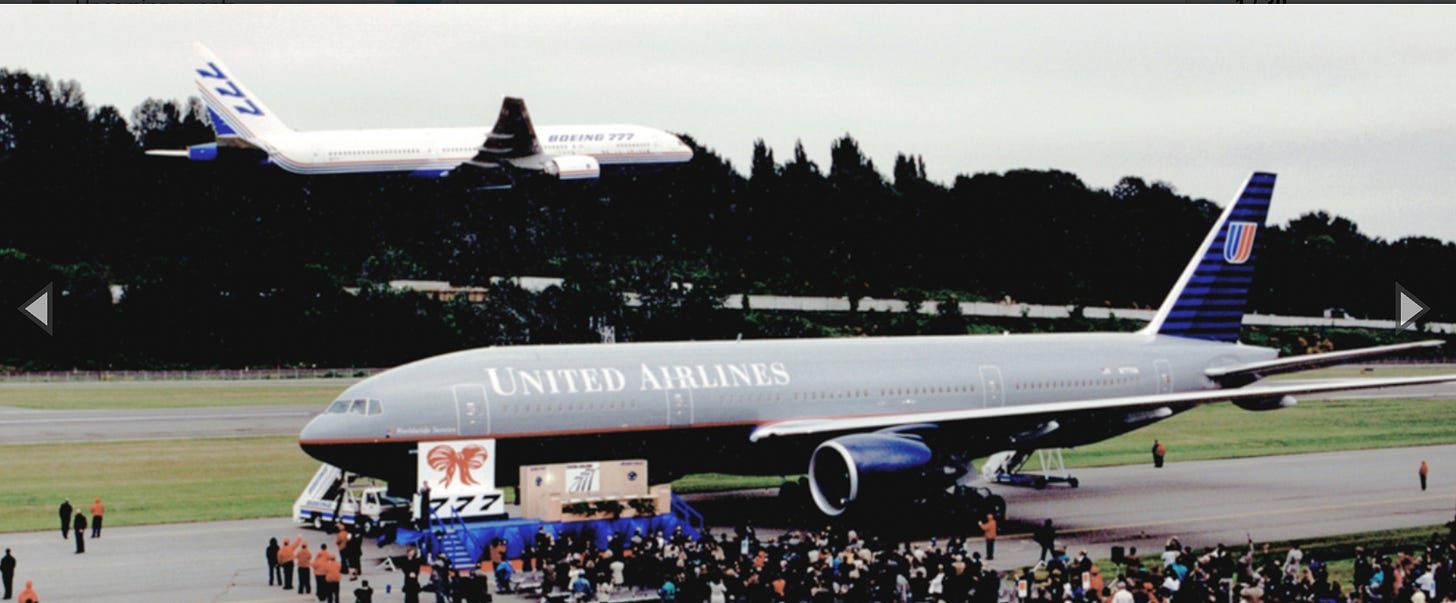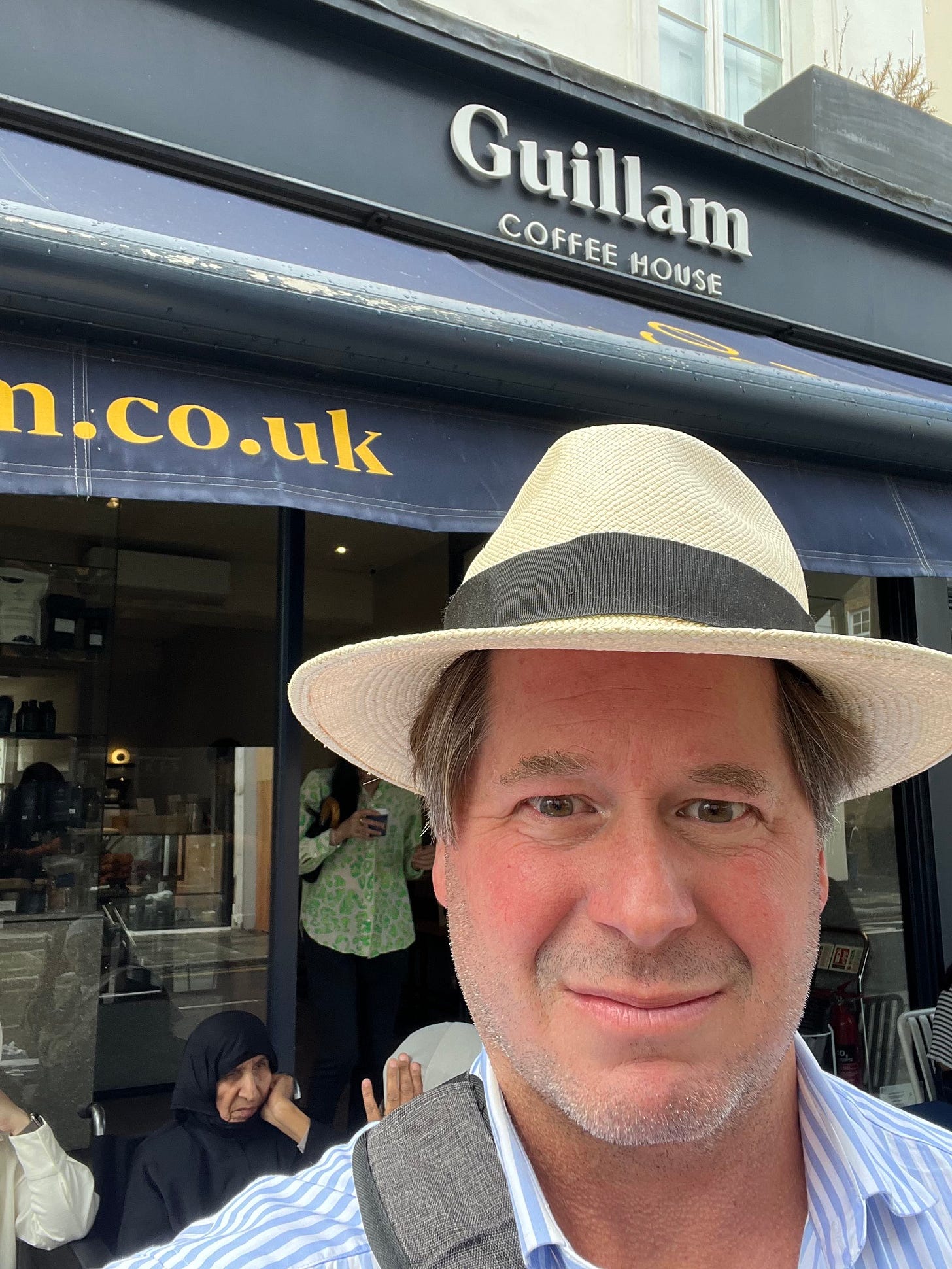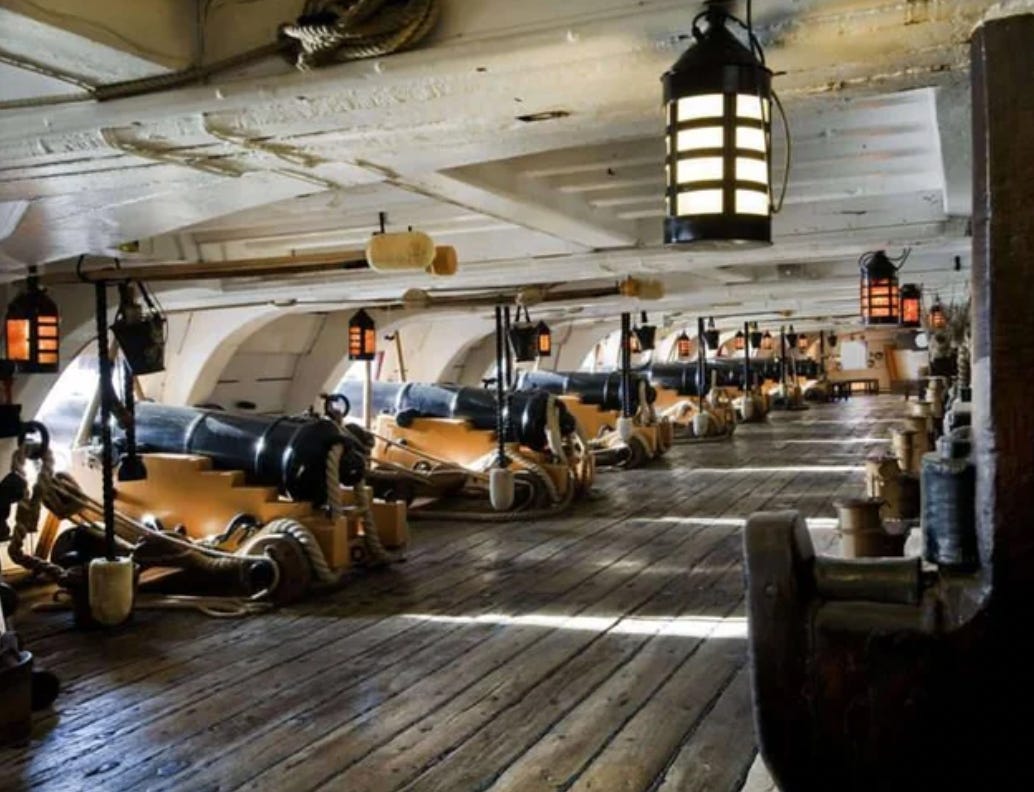Things Fall Apart: A Transatlantic Odyssey
Skilled laborers are what keep our advanced civilization going. We are reminded of this when critical transportation equipment breaks.
In recent years I’ve often thought that we, as a society, fail to appreciate how much our high living standard—our safety, creature comforts, and conveniences—are provided by an unseen and unsung army of skilled laborers.
Flip a switch and you have light; turn on a tap and you have clean water; adjust the thermostat and you have heat or AC; depress a lever and you flush the toilet. It wasn’t so long ago—a little over a century—that such conveniences were not available to even kings and emperors. Now most houses in the developed world are equipped with them.
Most of us take these comforts and conveniences—and hundreds of others—for granted. Likewise, we give little thought to the skilled workers who maintain them. If our civilization is going to maintain itself, we must have a large, skilled, and reliable workforce.
My recent trip home from Europe caused me to become concerned that airline maintenance departments are struggling to maintain their fleets of aging aircraft. For me, the result of mechanical problems was a comical experience of hassle and inconvenience. However, I fear that if airline maintenance departments are indeed understaffed with skilled and reliable people, the consequences could eventually be far more serious.
My journey began at the Vienna airport, where I zipped through security and quickly boarded my BA flight. I had a very tight connection in Heathrow, but it looked like we were going to push off on time.
Then the captain came on the PA. With pretty good Hugh Grant-bumbling British charm, he explained that the cargo door sensor was indicating the door was ajar, even though it seemed to be closed.
“But no worries, ladies and gentleman, the engineer will soon be here, put some magic spray on the thing, and then we’ll be off.”
The captain’s prophecy proved to be true, and we departed 25 minutes late. This would give me exactly 30 minutes on the ground in Heathrow to get to my connecting flight’s gate before boarding began.
We landed at Heathrow and pulled up to our gate. Glancing out a port window, I saw the jet-bridge. For some reason the aircraft had parked 70 yards from it, and it appeared to be the jet-bridge operator’s first day on the job.
Ever so slowly and halting, with multiple lateral corrections made with each foot advanced toward the aircraft, the jet-bridge seemed to be an eternity away from reaching us. Watching it inch forward was sheer agony. At last it made it to the plane and I got off and sprinted up the jet-bridge.
“Just follow the purple connections signs” said the stewardess as I set forth like Pheidippides running from Marathon to Athens.
Heathrow was apparently laid out by a drunk madman. My arrival gate might as well have been in another county, with a series of interminable corridors turning at right angles onto yet more interminable corridors.
At last I arrived at the security checkpoint just before the international departures section of Terminal 3. The line was long, but it moved fairly fast—until I arrived at the scanners. The lady directly in front of me was in her seventies and sitting in a wheelchair. A couple of security guys helped her out of her chair to hobble through the scanner, and she set off the alarm.
This initiated an extraordinary search of the poor old, disabled woman for weapons or explosives. The only rational explanation I could think of was that security was concerned that she was cognitively impaired and had been tricked into embedding C-4 on her person. Multiple scans of her limbs and swabbing of her hands for ammonium nitrate or whatever—all the while with me standing behind her, waiting for my turn to proceed through the scanner.
Finally I got through, but then the carry-on bag conveyor seized for no apparent reason. Two minutes elapsed, and then another two, and at last the belt started to move and my briefcase emerged, but then stopped again in plain sight but just beyond my reach—so close and yet so far away.
Finally it inched forward; I grabbed it and set off on the home stretch to my gate, which proved to be the furthest away in the entire terminal. I sprinted over half a mile before I finally reached it, a taste of rust in my mouth from running at maximum heart rate for about 5 minutes.
The flight was already boarding. I went my seat and tried to get some sleep for the remainder of the boarding process.
We took off at 11:00 a.m. sharp. About forty minutes into the flight, the cabin was prepared for meal service, and a pleasant feeling of well-being swept over me. I looked forward to eating lunch, as I had skipped breakfast and was hungry. After lunch, a long nap and then maybe a bit of reading. I reckoned I would, in just over eight hours, arrive in Dallas and have dinner with my mother that evening. It was a pleasant thought.
At 11:45, the captain came on the PR and said:
Folks, I am sorry to disturb you, but due to a mechanical problem, we cannot fly with this plane across the Atlantic, and we must return to London. I can assure you there is no danger, but for strict, regulatory reasons, we must take this precaution. We are about thirty minutes from London, and as soon as we are back on the ground, we should have additional information for you.
Thirty minutes elapsed, and then forty-five, and still the aircraft was at level flight at over thirty thousand feet. Clearly we weren’t flying back to London—at least not directly. A stewardess walked past.
“Excuse me, ma’am, but I don’t think we’re flying to London. Where are we flying?” I asked.
“We are flying to London, but first we must dump fuel because we are too heavy to land.”
Finally we landed in London. The captain came on the PA and explained in unusually formal English, suggesting a literary bent, that the AC packs on both engines—crucial for maintaining a comfortable cabin temperature and pressure—had failed. Additionally, the flight attendants had heard unusual mechanical sounds and detected an acrid smell. Though the engines had continued to run, the loss of the AC packs had obliged the captain to turn the airship back.
There we were, stopped on the tarmac at Heathrow with no gate assignment, waiting for a maintenance crew to assess the problem and ascertain how long it would take to fix it. I figured there was no way that two broken AC packs would be fixed anytime soon. The plane would have to go into a service hangar.
It seemed that all we could do was hope that American could scramble another 777—just as the airline had done on my outbound flight from Dallas when our first 777 had developed a maintenance issue after we pushed back.
To me, it it seemed like yesterday that the fabled “Triple 7” had entered service in 1995. Back then I was an aviation buff in my twenties and had marveled at the new machine with its stupendously strong airframe and huge new GE 90 turbofan engines—the biggest ever developed, producing up to 115,000 pounds of thrust. Now it seemed like an old horse—still willing to work, but often injured and in constant need of veterinarian care.
The captain came on the PA and explained that the plane could not be fixed with us onboard, so we would have to get off and go back to the terminal. Moreover, because he was reaching the end of his legally allowed daily work limit, he was signing off and wished us the best of luck.
It was, he elaborated, unclear how we were going to get to Dallas. One “hypothetical possibility,” he explained, was that American Airlines could get us on an American flight to JFK at some point that evening.
“From JFK, we will, out of courtesy, arrange flights on other airlines to your final destination," he explained.
How courteous, I thought. After all, I could have foraged for a connecting flight from JFK to Dallas on some other airline. American Airlines was really going the extra mile to volunteer to get me from New York to Dallas.
At last the buses arrived and took us to the terminal, but our only instruction was to “follow the purple signs for transfer.” Transfer to what?
My AA flight alert text message was going off every two minutes with different announcements about our new flight time. The first said we’d be taking off in 30 minutes, the second said 4:00 p.m., the third said 2:00 am, then a fourth said 10:00 am, and then a fifth said we were flying to JFK at 7:00 a.m.
A group of us arrived at what appeared to be an AA transfer desk. One agent told us to line up, then another told us to follow her back in the direction from which we’d come, and then another directed us to go through UK pass control and collect our bags. This we did, but when we arrived at the baggage claim, there was nothing on the digital display about which carousel would dispense our bags.
Word spread among my fellow stranded passengers that AA had a special baggage claim desk at the end of the corridor. We herded towards the desk and were met with a formidably long line. Then I heard talk that our bags would arrive at Carousel 5. By then I’d resigned myself to spending the night in London and logged onto my laptop with my cell phone hotspot to look for a room.
Then I heard someone say that AA was handing out hotel vouchers. I approached the man and asked, “Vouchers for what hotel?”
“The IBIS at Heathrow,” he replied.
I thought about the prospect of checking into the Heathrow IBIS—even though we still had no idea when our flight was departing—and my heart sank. I imagined myself in a grim modernist room with a stained carpet feeling sorry for myself. No, as tired as I was, I was determined to make the best of my night in the British capital.
I booked a room at the Pelham in South Kensington—a charming little boutique inn in a Victorian townhouse.
“Any idea when the luggage is going to come out?” a female voice said. I looked up from my laptop and saw an attractive young blonde woman.
“No,” I replied. “No one knows when the luggage will appear, or if it will ever appear. Maybe it no longer exists.”
She laughed and gave me what I interpreted to be a flirtatious look.
“Are you also stuck in London for the night,” I asked, wondering if she was akin to the sorceress Circe, who persuades Odysseus to stick around on the island of Aeaea.
“F—ck no,” the girl replied. “I just got on the phone with American f'-ing Airlines and got a different flight that leaves in an hour.”
“To where?" I asked.
“To Los Angeles direct. From there it’ll be easy enough to get home to San Diego.”
“Well done,” I said.
“When it comes to getting s—t done, I can make sh-t f—king happen. Only question now is, where is my f—king luggage?”
I wondered when it became cool for pretty young American girls to talk like New Jersey-based mafia hitmen.
I called American Airlines reservations and scored a seat on a 4:00 p.m. flight the next day.
The luggage didn’t come. A man who sounded to be of West Indian extraction approached and said, “Why are you waiting for your luggage? It may be hours before they take it off that broken plane.”
“What do you recommend that we do?” I asked.
“Show American Airlines your baggage claim number and they will find your bag and put it on your flight. Have you got a new flight?”
“Yes, it departs tomorrow at 4pm.”
“Great. Because it’s now less than 24 hours from now, you can check in now at the American counter in the departure terminal and show them your claim tag. They will find your bag and put it on your flight tomorrow.”
This I did, but when I arrived at the check in desk, the representative couldn’t find my 4:00 p.m. flight in his system.
“I’m sorry sir, I have no record of your reservation or even of this flight. In fact, I’ve never heard of a 4 p.m. flight to Dallas.”
The man seemed like a nice fellow from the Indian Subcontinent, but my patience had run out and I thought I might have to kill someone. I imagined saying the words — “Buddy, it’s nothing personal; you just happen to be at the wrong place at the wrong time” — and then doing something horrible. Fortunately I restrained myself and instead asked how one might go about finding my reservation.
I will spare the reader a telling of all that I had to go through to find an AA representative who as able to find my reservation, check me in, and give me a boarding pass. After this was finally accomplished, I walked out of the terminal to an empty taxi stand. A few minutes later, a cab pulled up and offloaded a patrician looking, elderly Japanese couple.
“Feel free to get into the cab, mate,” the driver said. “I just need to sort out the payment with these lovely people.”
Something went amiss in the payment procedure. The elderly Japanese couple couldn’t speak English and their credit card apparently didn’t work. I gazed out the window to take a closer look at them. They were a truly ancient couple, probably well into their nineties, and I admired them for staying in the traveling game so late in light. Now if only they could figure out how to pay their taxi fare to the airport.
At last I arrived at the Pelham and checked into my room. By then I had such a splitting headache that I wondered if I was having a hemorrhagic stroke. I thought of my old British army buddy, Duncan, who was fond of saying, “Whenever everything is going wrong and all seems lost, start drinking.”
And so, I went into the Pelham’s charming little parlor with an open bar, poured myself a stiff gin & tonic, and struck up a conversation with a delightful couple about my age—the woman from England, the man from Australia. I told them I’d just written a book about vaccine chicanery. They said they knew an alarming number of relatively young people who had died unexpectedly in recent years or had heart attacks or developed aggressive cancers, which had made them wonder about the COVID-19 vaccine.
The gin & tonic made my headache considerably worse, so I decided to head up to my room to take a hot shower and go to bed. Alas, like many boutique hotels in South Kensington and Chelsea, the Pelham has a bewildering maze of staircases and little hallways that branch off and terminate. Staggering up to my room, I felt suddenly imprisoned in the M.C. Escher’s famous “Relativity” painting.
I tried to return to the reception, but ended up going down a staircase that led to a fire escape on the street level. I backtracked and wound up on yet another staircase that dead-ended at a street level fire escape. After what seemed like an eternity, I found my way back to the reception and asked for directions to room 105. The polite fellow from India explained that I needed to take the elevator to floor two, then go left and down a half flight of stairs to a sort of mezzanine level, where I would find my room. This sounded straightforward enough, but alas, I got lost again.
Finally I found my room, took a shower, climbed into bed, and passed out. The next morning I was awakened by what sounded like someone using a power grinder to saw a tuba. Thankfully the excruciating noise didn’t last long.
I got up and and had a nice breakfast in the basement dining room of the Pelham and then got lost again returning to my room. After I eventually found it, I showed and checked out.
With no luggage except my briefcase and laptop, I was free to walk to one of my favorite coffee shops in South Kensington, a cute little place called Guillam. It was pleasant summer day in London—not too hot—and again, I felt a sense of wellbeing sweep over me as I walked past the Museum of Natural History—that extraordinary monument to the Victorian era’s great explorers and naturalists.
At Guillam I ordered a double cappuccino and felt a sudden burst of optimism. Surely, I thought, my second flight was be as smooth as silk. I logged onto AA’s flight status page, entered my flight number, and saw that it was delayed by two hours.
A little research revealed that the AA Boing 777 had originated at DFW, serving as a substitute for the initial aircraft that had developed maintenance problems, and had therefore arrived at Heathrow several hours late. This is precisely what happened to me on my outbound flight from Dallas to Heathrow several weeks earlier.
I thought of my younger brother on Maui—a general contractor who is finding it increasingly difficult to find skilled labor. Working on commercial aircraft is NOT a bullshit job. You either know what you are doing or you don’t.
Vexed and grim-visaged, I called an Uber from Cafe Guillam to head to Heathrow.
At the airport, I did some laptop work in the Admiral’s Club lounge for a couple of hours, and then headed for the gate to catch the 6:00 p.m. flight.
Boarding was completed shortly after 6:00, but then . . . we didn’t push back.
I asked a passing steward, “Are we not pushing back?”
“Well,” he said, “It seems that British Air Traffic Control has experienced a major, systemwide failure. They are saying they’ve now got their systems up and running, but we are still looking at a delay. The good news is, the airline wouldn’t have boarded only to have you sit here on the ground for hours and hours.”
Finally the captain came on the PA, but the PA didn’t amplify his voice, which made it sound like his was murmuring to his co-pilot. No one could hear what he was saying.
And so, like 18th century naval vessels, his words were passed back through the cabin by way of the stewards, who explained that we were probably contending with about an hour delay before we could take off.
I thought of the Flying Dutchman—the cursed sea captain stuck in a maelstrom off the coast of Norway who is doomed to be stuck at sea forever, never reaching port. As Wagner conceived the story, only the love of a good woman named Senta can redeem and liberate the Flying Dutchman.
In my case, I was apparently doomed to remain forever at the London airport, unable to embark to cross the Atlantic and get home. I was, it seemed, the Immobile Texan. What could free me from my curse?
After an hour elapsed, the captain came on the PA and murmured something, and the stewards quickly passed back the word that we had our takeoff slot and were pushing back. This was true; we began to reverse back and I heard the sound of the engines turning over.
“Captain is lighting the fires,” I texted my mother. “Not holding my breath though.”
The engines engaged and we taxied to the takeoff runway. At last we were next in line, and I heard the gigantic GE 90s spool up and the plane lurched forward. I smiled at the power of the engines—truly one of mankind’s greatest technical achievements. Many of the passengers onboard were from my doomed flight the day before, and we simultaneously burst into applause. Bravo!
We arrived in Dallas at about 11:45 and I finally crawled into bed around 1:30. As irritated as I’d been for 36 hours, I marveled that an aircraft had safely flown me from London to Dallas in 9 hours and 40 minutes.
To put this achievement into perspective: My great grandmother—whom I had known well during my boyhood—was born during a time when the trip from London to Dallas would have taken at least two weeks—that is, London to Southhampton by train, then a steamship from Southhampton to New York, and then a train from New York to Dallas.
We should always be grateful for the extraordinary ingenuity, diligence, and skill that made such a wonder possible. Without a sufficient skilled workforce to maintain all of these technical wonders that we take for granted, they will break down and our standard of living will precipitously decline.









Good story John. I pilot the B777 for a major airline and I can say that although the -200Bs are getting older, maintenance teams are top notch. Procedures are outlined so that even newbies have a solid frame work to trouble shoot. I have no reason to doubt the MX on our ships. The ships are getting tired. But, as you say, they are willing work horses and they are truly a marvel to fly.
This is why I try not to go anywhere if I can't travel there by car. Air travel was a lot more fun back in 1992.